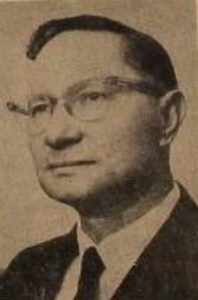
Dr. John Coleman Bennett was a theologian, minister in the United Church, and Christian ethicist. Bennett was Reinhold Neibuhr Professor of Social Ethics and the Dean of the Faculty at Union Theological Seminary, New York. His scholarship focused on the relationship between Christianity and political issues and social problems. He was born in Kingston and studied at William’s College, Oxford University and Union Theological Seminary, where he became faculty in 1943 and stayed until his retirement in 1970. He was a member of the National Council of Churches and the Council on Foreign Affairs, and lectured extensively across the United States, and in Asia, Japan, and Italy. He is the author of numerous books including Social Salvation (1935), Christianity – And Our World (1936), Christian Realism (1941), and Foreign Policy in Christian Perspective (1966). He was the first theologian to be Dunning Trust lecturer. He was also an activist, participating in protests for civil right, against the Vietnam War, as well as advocating for gay and lesbian rights within the church.
John Coleman Bennett gave three lectures joining religious belief with political realism: Christian Morality and Political Decisions, Christian Faith and the Conflict of Ideologies, & The Christian Conscience and the Nuclear Dilemma. His first lecture addressed the problem of relating Christian morality to political decisions. In the context of 1960s social and political movements, a Christian could not separate his religious life from world affairs. However, he said, that did not mean religious fervour needed to be brought to politics: the Cold War was not a Holy War, and they should not attempt to make it into a crusade. In his second lecture, he developed upon this theme, asking what Christians should stand for in the Cold War. He encouraged his audience to be guided by three principles: a limited state, social justice and welfare for all, and universal suffrage. Again, he urged against the conflation of politics with religion, lest we begin to think of Communism as a homogeneous wave of evil instead of recognizing its many varieties and diversity. Instead, he argued, Christians must be tolerant of different political and economic experiments, and accept that Marxism may be the best political system for some nations. His third lecture addressed the problems of Christianity in the nuclear age. He stressed Canada’s role, in particular, as a moral power that could drive for nuclear disarmament. He also saw hope in both sides’ awareness of the consequences of nuclear foreign policy for both morality and politics.
While at Queen’s, Bennett also gave a talk sponsored by Catholic students’ groups in which he addressed the hypothetical consequences of a Roman Catholic majority in the United States, the role of religious education in the America educational system, and the place of Roman Catholics in the US more broadly.
Listen to an excerpt or read the full transcript below.